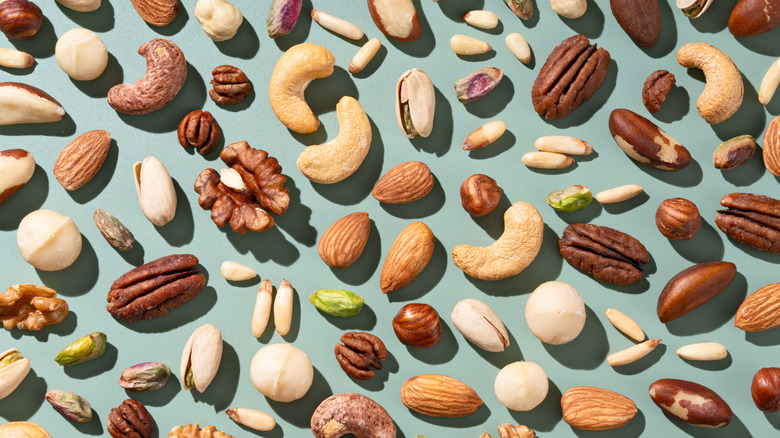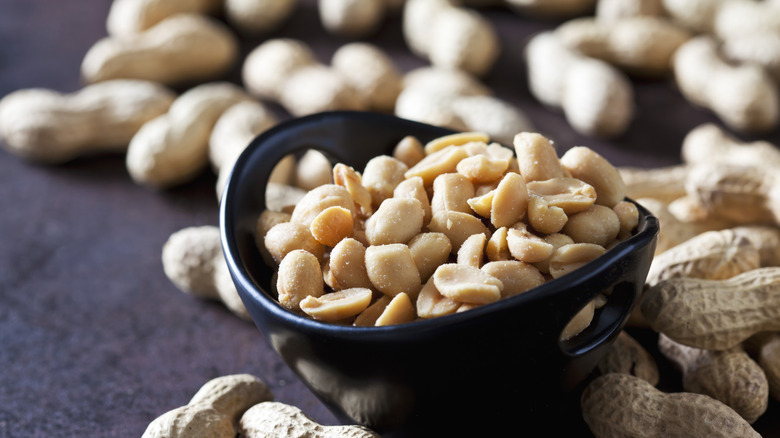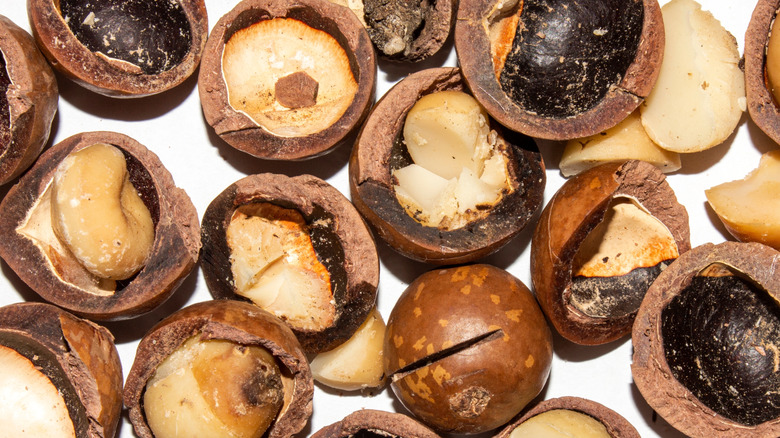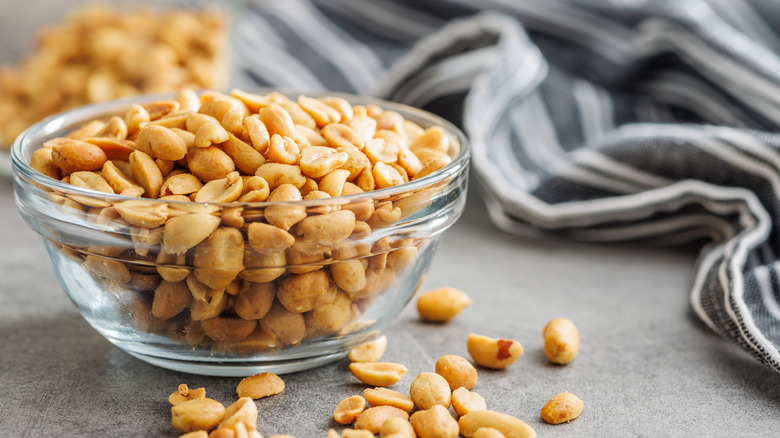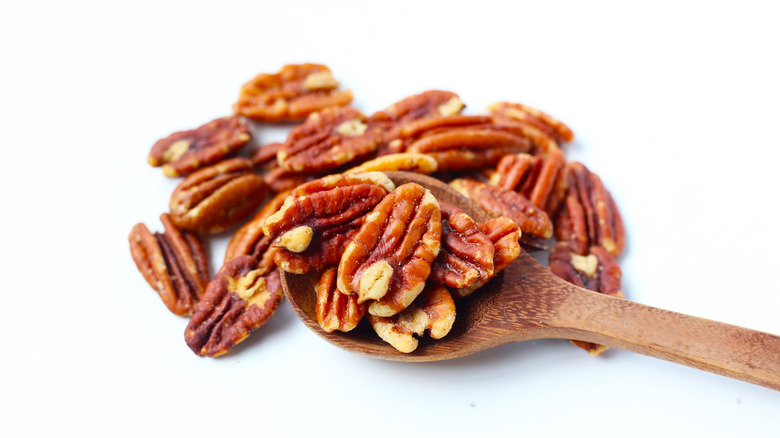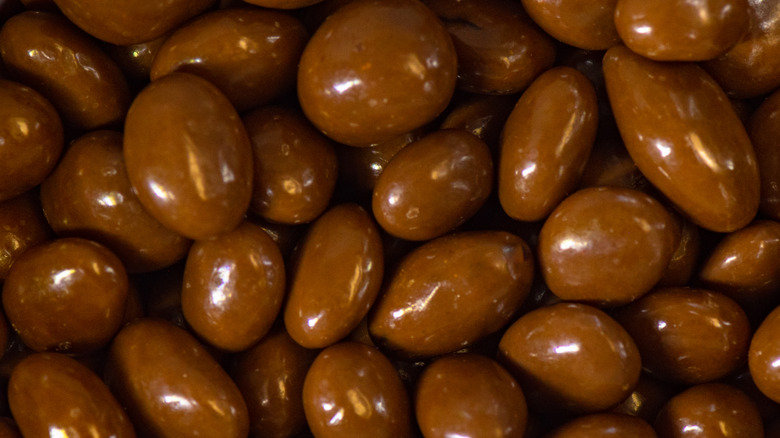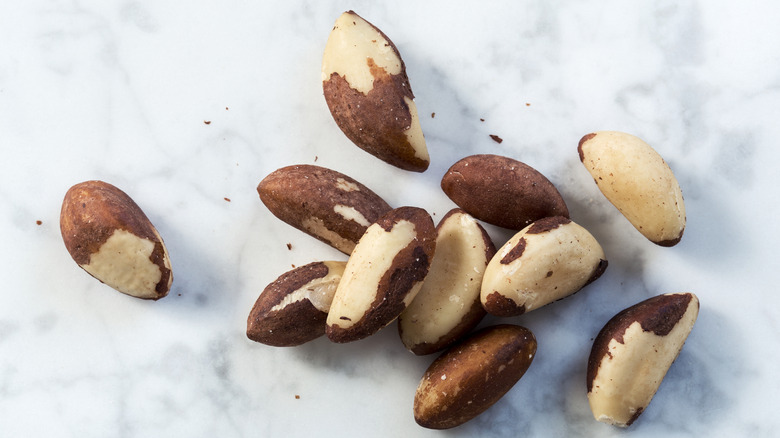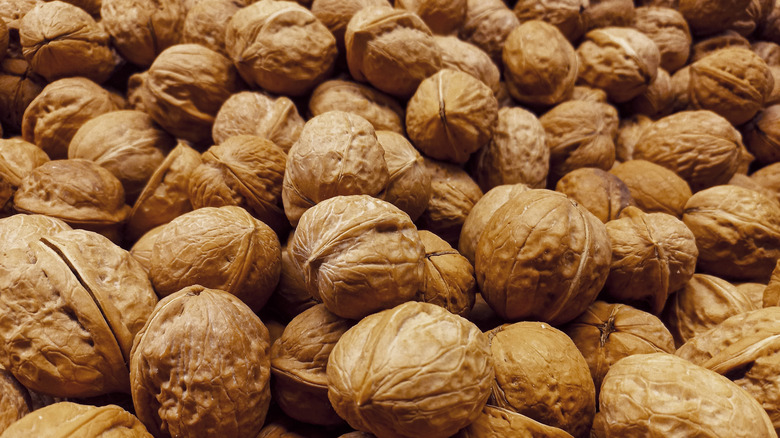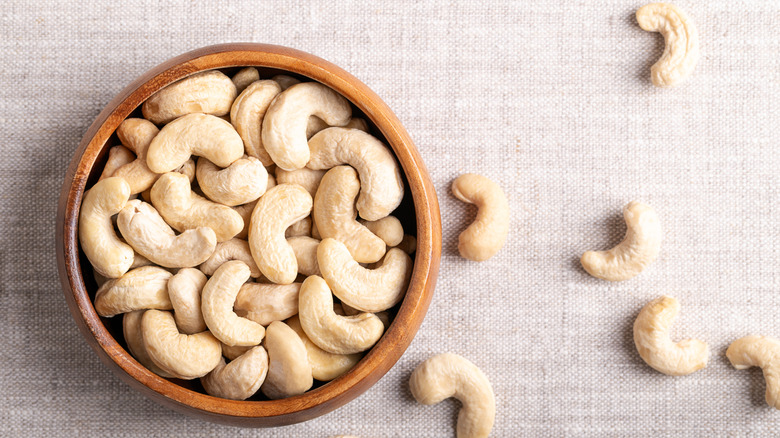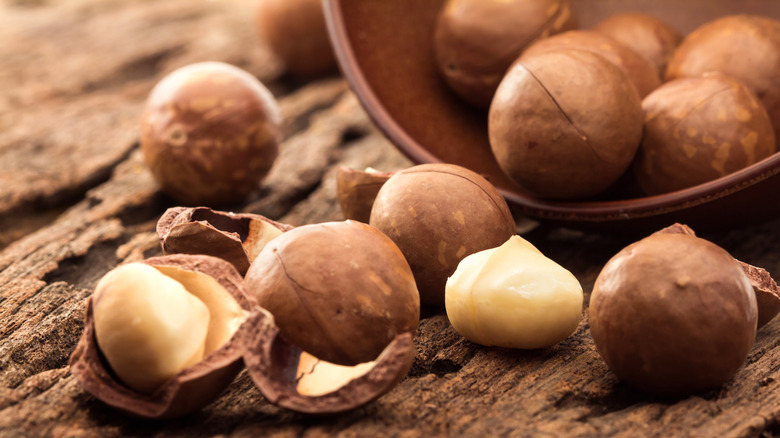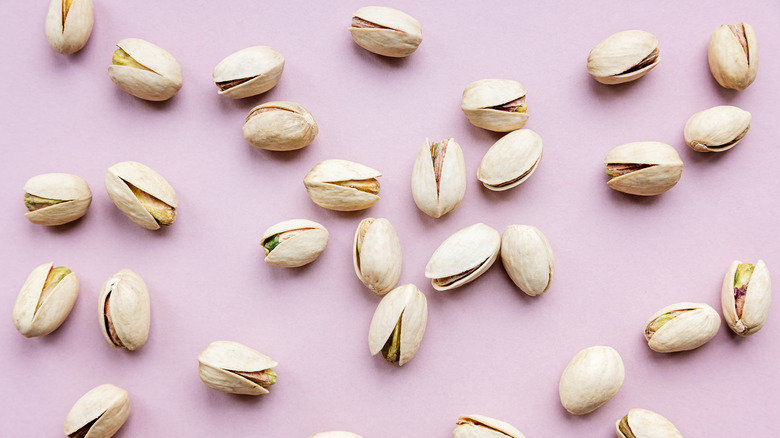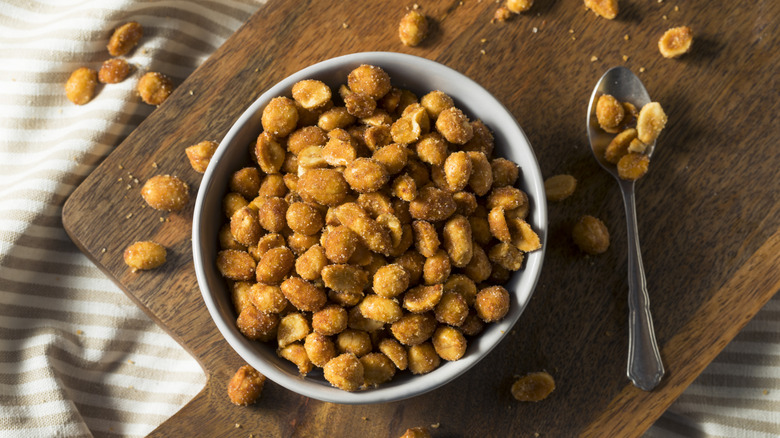The Biggest Nut Recalls In US History
Whether you're nuts for nuts or shy on the shelled snack, you can't deny the prevalence of nuts in American culture. Peanuts are an icon of baseball games, pecans are go-tos for a sweet and rich holiday pie, and walnuts are the original brain food. The Mayo Clinic even suggests that nuts can help lower cholesterol and lower the risk of high blood pressure. It's no wonder people adore this fun, bite-sized snack. But what happens when your go-to fave isn't an option?
Food recalls mean the food item in question needs to be tossed or returned to the store due to a health or safety issue. Most consumers think of meats, cheese, and dairy products when they think of food recalls, but one of the guiltiest parties out there for foodborne illness and packaging mix-ups is the good ole nut. Here are the biggest nut recalls in U.S. history.
Hormel recalled Planters Peanuts due to potential listeria contamination (2025)
Mr. Peanut has a signature look that any grocery store shopper would recognize. Planters is so confident in its brand that it even drove a giant peanut across the United States of America. That's what makes this recall all the more shocking. In May 2025, Hormel Foods Sales, LLC voluntarily recalled Planters Honey Roasted Peanuts (4 ounce package) and Planters Deluxe Lightly Salted Mixed Nuts (8 ounce canister) due to potential contamination with Listeria monocytogenes.
This bacteria can cause serious damage when ingested into the human body. Infants, children, the elderly, and people with weakened immune systems may suffer fatal complications due to listeria exposure. Even healthy individuals could suffer high fever, nausea, muscle pain, vomiting, and diarrhea lasting a few days. Pregnant mothers are at an even greater risk, as listeria could cause miscarriages or stillbirth. Luckily, no major illnesses have been reported due to this outbreak, and at the time of this writing, no other sizes or varieties of Planters peanuts needed to be recalled.
Mauna Loa Dark Chocolate Covered Macadamia Nuts recalled after almonds and cashews unexpectedly mixed in (2025)
So your friend just came back from Hawaii and they brought you a thoughtful, delicious souvenir. The problem is that yummy treat from the islands wasn't exactly what you expected. You bite into a dark chocolate-covered macadamia nut isn't actually a macadamia nut — it's an almond! Or is it a cashew? Either way, this mix-up could have had serious repercussions for those with an almond or cashew allergy.
Mauna Loa Macadamia Nut Company LLC voluntarily recalled its Mauna Loa Dark Chocolate Covered Macadamia Nuts (0.6 ounce and 4 ounce bags) in late April 2025, because of the possible presence of undeclared almonds and cashews. These bags were distributed to Arizona, California, Colorado, Florida, Hawaii, Illinois, Maine, Minnestoa, New Jersey, Oregon, Pennsylvania, Texas, Utah, Virginia, Washington, Wisconsin, and Guam.
Unlike the Trophy Nut Co. recall, this recall was not initiated by a customer complaint. The company's internal quality control caught the issue. Thankfully, no illnesses or severe allergic reactions have been reported at the time of this writing.
Trophy Nut Co. recalled 143 cases of Honey Roasted Peanuts that contained cashews (2025)
In 2025, the Trophy Nut Company recalled its Honey Roasted Peanuts, which were distributed to Heinen's Grocery stores from October 24, 2024 to April 4, 2025. The 8.25 ounce cans of peanuts were recalled due to one customer complaining that their can contained cashews. Now, this wouldn't be a huge deal for those who don't mind a surprise nut or two (kind of like finding an onion ring in your batch of fries), but this is a serious offense that could mean life or death for folks with a cashew allergy.
Nut allergies and food allergies in general can be extremely life-threatening, so finding an unexpected allergen in an otherwise safe food could mean a terrifying trip to the hospital. According to the Food Allergy Research Association, one in 10 adults has a food allergy, and 51% have experienced a severe reaction in their lifetime. The U.S. Food and Drug Administration (FDA) writes that one customer reported an allergic reaction after consuming this product.
Pecan Star & Nut Corp. recalled nearly 8,000 bags of pecan halves sold at Publix due to mislabeling (2024)
Many home chefs and bakers use pecans in their daily lives. There are numerous health benefits to this nut, and it can be used in a variety of dishes, sweet or savory. People have the option to buy them whole, halved, or crushed. The only thing consumers should be wary of, though, is what company they're buying from.
In December 2024, Pecan Star & Nut Corp. voluntarily recalled its Organic Pecan Halves due to undeclared walnuts. Although the number of pounds is yet to be recorded, nearly 8,000 bags were recalled. The recall is still ongoing at the time of this writing, and the recall states are limited to Alabama, Florida, Georgia, Kentucky, North Carolina, South Carolina, Tennessee, and Virginia. According to the Pecan Star & Nut Corp. alert, this issue came about because the production line received incorrect package material. So far, there has not been any news regarding any illnesses or allergic reactions that have happened due to this recall.
Cal Yee Farm LLC recalled over 10 types of nut and snack products (2024)
Nuts are generally considered to be a superfood as they have tons of health benefits. It's even better when food companies decide to make an already delicious snack even more delectable! Nuts are one of those foods that people love to add to oatmeal, eat in trail mix, coat in chocolate, or even coat in yogurt. Even though these nut spinoffs are often scrumptious, things can go wrong.
In December 2024, Call Yee Farm LLC of Suisun Valley, California recalled more than 10 types of chocolate and yogurt-covered nut snack products due to potential undeclared allergens (almond, milk, soy, wheat, sesame, and FD&C Yellow #6). These included Dark Chocolate Walnuts, Dark Chocolate Raisins, Dark Chocolate Almonds, Yogurt Coated Almonds, Tropical Trail Mix, and Butter Toffee Almonds. The products were distributed across California, Arizona, Virginia, New Mexico, Texas, Tennessee, Oregon, Ohio, and Pennsylvania. Thankfully, no illnesses were reported as a result of this recall.
Now Real Foods recalled Brazil Nuts over mold and yeast (2024)
One of the major signs of food spoilage is mold. You hate to see it on bread, cheese, fruits, and veggies, but did you know that mold can grow on nuts too? If you eat a small amount of mold, you'll probably live to tell the tale, but if you buy a brand new package of nuts and find they're already moldy? That's an immediate red flag.
Now Real Foods needed to deal with this exact issue. In August 2024, the company needed to recall its whole and unsalted raw Brazil nuts due to the product's high mold, yeast, and total viable count. The products were distributed all over the United States as well as Singapore. Although there have been no reports of illnesses, this is still considered a Class II risk, which, according to the FDA, means that negative, but reversible, health consequences are possible when ingesting this product.
Stutz Packing Company recalled walnuts possibly contaminated with listeria (2024)
Walnuts haven't gotten their time in the spotlight in quite some time, but they have a number of substantial health benefits. For this reason, it would behoove the average nut consumer to try purchasing walnuts every now and then. Unfortunately, there was a recent walnut recall.
Stutz Packing Company in Indio, California recalled its 1-pound Shelled Walnuts due to a potential contamination of Listeria monocytogenes in July 2024. As discussed with the Planters recall, listeria is a dangerous bacterium to humans; milder reactions include high fevers, muscle pain, headaches, and nausea; more serious factors could be miscarriage or stillbirth in pregnant women, or death in worst-case scenarios.
This contamination was found during a routine sampling. Luckily, no other sizes or varieties of shelled walnuts were recalled. The contaminated nuts were originally sent to food bank warehouses in Texas and Arizona, then further distributed to other centers that can reach consumers, smaller food banks, school lunch programs, shelters, or prison food systems. Luckily, there have not been any reports of illnesses related to this recall.
Wenders LLC recalled cashews sold at Trader Joe's in 16 states because of salmonella concerns (2024)
Everyone loves Trader Joe's — it's known for viral snacks, frozen food, and fun, quirky seasonal items. It also offers some pretty overlooked hidden gems that customers really should be buying. If you've ever shopped at the quaint, laid-back grocery store, you'll know there's a substantial section of packaged nuts. Many people gravitate towards it to grab a snack for a hike or a topping for yogurt.
But, in March 2024, Wenders LLC recalled cashews sold at Trader Joe's in 16 states because of salmonella concerns. The product was 50% Less Salt Roasted & Salted Whole Cashews, and it was sold in Trader Joe's stores in Alabama, Arkansas, Arizona, California, Colorado, Idaho, Kansas, Louisiana, New Mexico, Nevada, Oklahoma, Oregon, Tennessee, Texas, Utah, and Washington.
Salmonella contamination is a very serious issue, but it's not normally associated with nuts. The bacteria are normally known for their prevalence in eggs and meat, but can easily be found in any food product as long as it was in contact with salmonella. According to the Cleveland Clinic, salmonella is one of the most common types of bacterial food poisonings in the U.S. Thankfully, no one has reported illness due to this recall.
Now Real Food recalled Macadamia nuts for possible salmonella contamination (2020)
Macadamia nuts are often seen in chocolate bars and in milk form, but this nut can be enjoyed in any form. But, in 2020, Now Health Group, Inc. recalled its Now Real Food Raw Macadamia Nuts due to a salmonella contamination.
With what we've learned from the Wenders recall, salmonella is a serious problem in food safety. This bacterium can lead to serious health issues in young children, the elderly, and the immunocompromised. Unfortunately, harboring a salmonella infection may even lead to death. In non-fatal cases, symptoms include diarrhea, fever, and stomach cramps for a few days.
The company first became aware of the salmonella contamination during a routine sampling of a later-process product. That batch was never released. No other Now products were affected during this recall and thankfully, there were no reports of illness or infection.
ARO Pistachio, Torn and Glasser, Inc. recalled 550,000 pounds of Pistachios due to salmonella contamination (2013)
Pistachios are one of the fancier nuts on this list — now often seen in the viral Dubai chocolate bar and similar recipes. This green nut is earthy, sweet, buttery, and overall delectable — that is, unless it's contaminated with bacteria.
In 2013, ARO Pistachio, Torn and Glasser, Inc. voluntarily recalled 550,000 pounds of Pistachios due to salmonella contamination. This was considered a Class II recall at first, but was then upgraded to a Class I recall, the most serious type of recall issued by the FDA. In a Class I recall, exposure to the recalled material or food could cause serious negative health consequences and, in some cases, death.
Multiple labels and brands needed to pull pistachios off the shelves because of this recall. Some brands affected were Sprouts, Sun Harvest, and Hilo. Luckily, despite the multiple labels affected and the thousands of pounds recalled, there were no reports of illness from this recall.
Sunland Inc. recalled Roasted Blanched Peanuts due to salmonella contamination (2012)
Last, but by no means least, on our list is the Roasted Blanched Peanuts from Sunland. Most people think of baseball games, road trips, and easy snacking when they think of peanuts. I mean, what can go wrong? Apparently, a lot.
In 2012, Sunland Inc. recalled a number of its nut products due to a salmonella contamination. Among those products was its Roasted Blanched Peanuts. Products made with Sunland nuts were also affected by this contamination and were included in the recall. Upwards of 90 products were recalled in total. This outbreak was so serious that it garnered a Class I recall. The brands affected by this recall included Trader Joe's, Sunland, Archer Farms, Fresh & Easy, Heinen's, Joseph's, Natural Value, Naturally More, Open Nature, and many more. Approximately 42 people fell ill because of this contamination, and 19 states were linked to this recall. Due to this case's staggering numbers, it is surely one of the biggest nut recalls in U.S. history.
